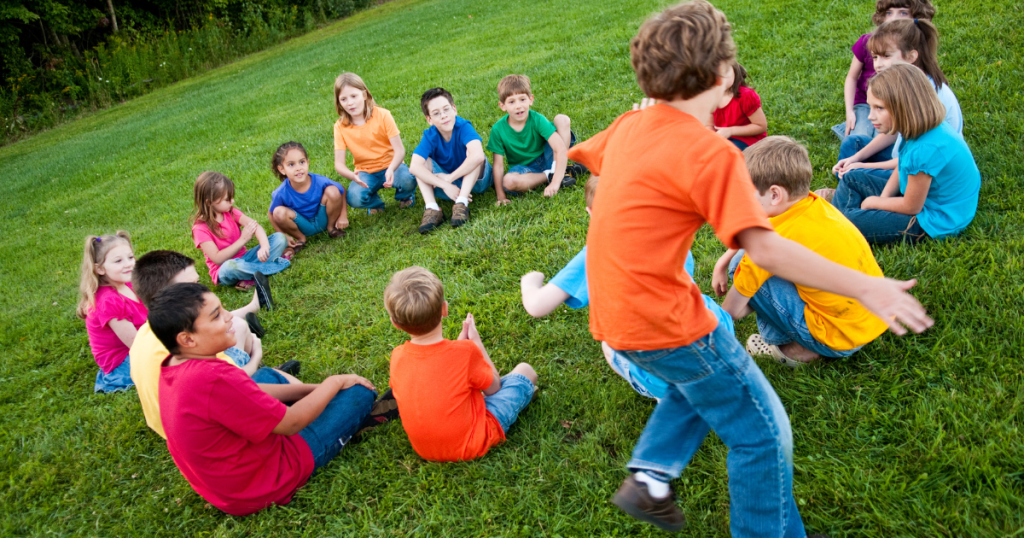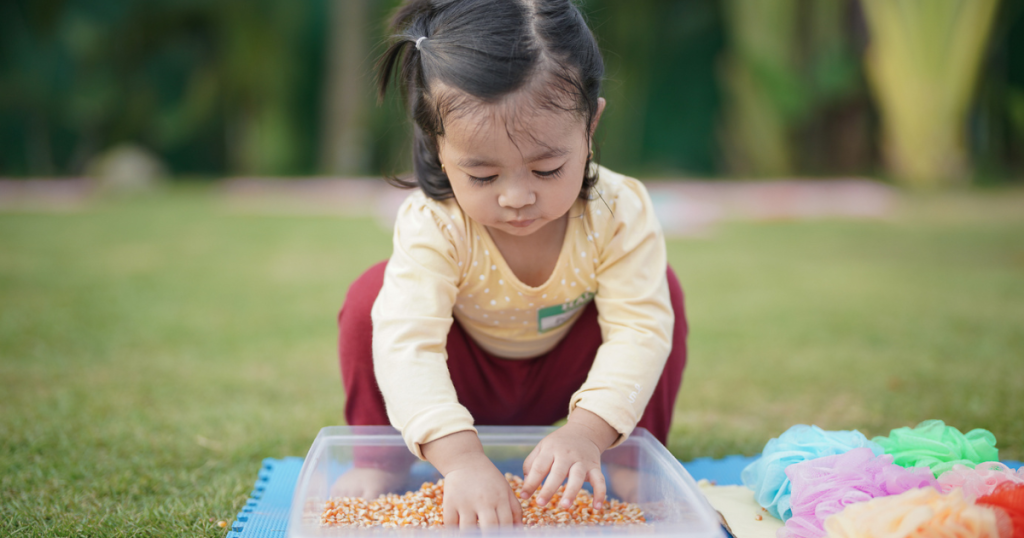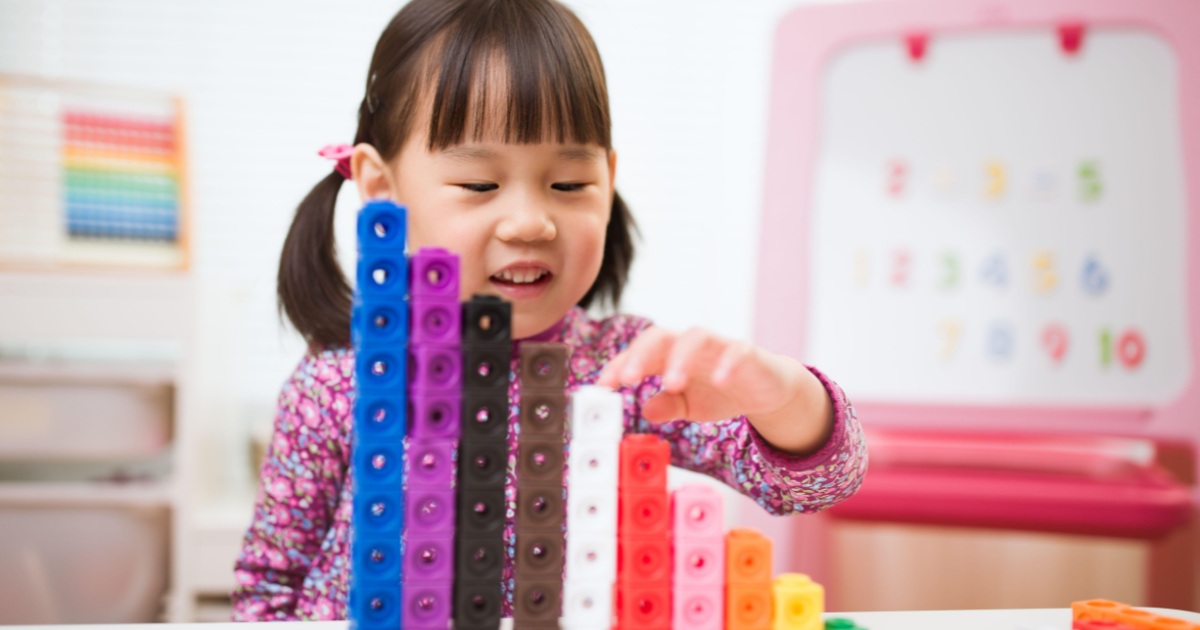Early childhood is a critical time for learning and development, and play is one of the most effective ways for young children to grow.
Educational video games and hands-on activities make learning fun and help children develop motor skills, thinking abilities, social skills, and important life skills.
Using everyday household items for structured play gives children meaningful, hands-on learning in a fun way.
Game 1: Indoor Obstacle Course
Transform your living room into a mini obstacle course using pillows, chairs, and toys. Encourage your child to crawl under tables, hop over cushions, or weave around chairs from a start line to the finish.
What You’ll Need: Pillows, chairs, toys, tape (optional for start/finish line).
How to Play:
- Set up an obstacle course using household items.
- Demonstrate the path once, then let your child navigate the course.
- Time the course for added fun or challenge them to complete it in different ways.
Game 2: Red Light, Green Light
Play the classic red light green light game in a hallway or open space. Children practice stopping at the “red light” and moving on “green light,” while everyone follows the rules.
What You’ll Need: Open space, optional start and finish markers.
How to Play:
- Choose one child to be the traffic light.
- Call out “green light” for kids to move forward and “red light” for them to stop.
- If someone moves during a red light, they return to the start.
- First to the finish wins, then rotate roles.
Game 3: Duck, Duck, Goose
Invite your children to sit in a circle and play duck, duck, goose. They can take turns walking around the circle and choosing someone to chase.
What You’ll Need: Enough space for children to sit in a circle.
How to Play:
- One child walks around the outside, tapping heads, saying “duck” until choosing “goose.”
- The “goose” must chase the tapper around the circle.
- If the tapper reaches the open spot, the “goose” becomes the next tapper.

Game 4: Hide and Seek
A timeless favorite, hide and seek encourages kids to find hidden friends around the house or yard.
What You’ll Need: No materials needed, optional hiding spots.
How to Play:
- One child counts while the others hide.
- After counting, the seeker looks for hidden players.
- The first one found becomes the next seeker.
Game 5: DIY Sensory Bins
Fill a cardboard box or plastic bin with rice, beans, water beads, or sand. Add small toys and tools for exploration.
What You’ll Need: Plastic bin, rice/beans/sand, small toys, spoons, cups.
How to Play:
- Fill the bin with chosen materials and hide small toys inside.
- Encourage children to dig, scoop, and explore.
- Ask them to find specific items or describe the textures they feel.

Game 6: Indoor Treasure Hunt
Hide small objects and give children clues or a simple map. They can follow the hints to find the hidden treasures.
What You’ll Need: Small objects to hide, paper for clues, or a simple map.
How to Play:
- Hide objects around a room or house.
- Provide clues or a map for your child to follow.
- Celebrate when they find the treasures!
Game 7: Indoor Bowling
Set up soft toys or empty bottles as pins and let your child roll a ball to knock them down.
What You’ll Need: Softball, empty plastic bottles, or plush toys for pins.
How to Play:
- Arrange the “pins” in a triangle at one end of a hallway or room.
- Let your child roll the ball to knock down the pins.
- Keep score or see how many rounds they can clear.
Game 8: Matching Pairs
Use cards, toys, or household objects to create a matching pairs game. Encourage your child to find the pairs by memory.
What You’ll Need: Cards, small toys, or objects in pairs.
How to Play:
- Lay objects face down or mix them up.
- Children take turns flipping two at a time to find matches.
- Continue until all pairs are found.
Game 9: Treasure Hunt
Hide small objects around the house and provide clues or a map for your child to find them.
What You’ll Need: Small objects, paper for clues, optional map.
How to Play:
- Hide objects in different rooms.
- Give children clues to lead them to each treasure.
- Celebrate each discovery or the final treasure.
Game 10: DIY Art Station
Set up a space with paper, crayons, safe paints, and other craft supplies. Allow your child to create freely or follow simple prompts.
What You’ll Need: Paper, crayons, paints, brushes, scissors, glue, and safe craft supplies.
How to Play:
- Set up a table or floor space for art-making.
- Offer prompts (like “draw your favorite animal”) or let them create freely.
- Display their artwork to celebrate their creations.

Tips for Playing Preschool Games at Home
- Rotate games to maintain engagement and keep activities fresh.
- Incorporate rainy day activities to keep children active indoors.
- Choose games based on your child’s developmental stage and interests to ensure they are both fun and challenging.
- Include opportunities for children to practice social skills, like holding hands, sharing, and teamwork.
- Set clear rules and a start line for each game to help children understand structure and follow directions.
- Use things around the house, like a cardboard box, cushions, or chairs, to make hands-on activities that encourage creativity and problem-solving.
- Encourage cooperative play, such as duck duck goose or red light green light, to teach patience, taking turns, and respect for others.
- Add calm, educational activities, like matching cards or video games, to balance active and quiet play.
- Celebrate accomplishments, whether completing an obstacle course or finishing a treasure hunt, to build confidence and motivation.
- Make it interactive by sitting in a circle or joining your child during games, fostering connection and engagement.
Benefits of Private Preschools for Early Learning
Private preschools offer children a nurturing and structured environment that fosters early learning and development. Smaller class sizes enable more individualized attention, helping children build confidence, social skills, and a strong foundation in language, math, and problem-solving.
With access to enriched activities, hands-on experiences, and trained educators, children in private preschools often develop essential life skills and a love of learning that prepares them for kindergarten and beyond.
Frequently Asked Questions
Why are preschool games at home important for my child?
Learning through play in a familiar setting supports cognitive, emotional, and motor development while making education enjoyable and engaging.
Can preschool games at home replace preschool or daycare activities?
Home activities complement formal learning, giving children extra practice while benefiting from parent involvement in their early education.
How do preschool games at home improve learning outcomes?
Games help develop problem-solving, memory, language, and independent thinking skills, building a strong foundation for future learning.
How much time should my child spend on preschool games at home?
Keep play sessions short, about 15–30 minutes, to balance structured activities, free play, and rest.
Can preschool games at home help with social skills?
Absolutely. Games that involve siblings or parents teach cooperation, sharing, and turn-taking, essential social skills for young children.
What if my child loses interest quickly?
Rotate games regularly and adapt activities to match your child’s attention span. Keeping play fresh and varied maintains engagement and excitement.
Can preschool games at home prepare my child for kindergarten?
Activities with counting, shapes, language, and problem-solving build confidence and curiosity, helping children get ready for school.
How do I know which games are right for my child?
Choose games based on your child’s developmental stage and interests, observe their skills, and adjust difficulty as needed to ensure a fun and rewarding experience.
Can preschool games at home help teach life skills?
Yes. Games like red light green light, duck duck goose, and obstacle courses teach important skills such as patience, teamwork, and following directions.
What are some creative ways to use household items for games?
You can turn everyday items like a cardboard box, cushions, or chairs into hands-on activities that encourage movement, problem-solving, and imaginative play.
Preschool Games at Home
Preschool games at home provide interactive ways for children to develop essential skills such as motor coordination, social interaction, language, problem-solving, and creativity.
From indoor obstacle courses to classic games like red light green light and duck, duck, goose, these activities help kids learn while giving parents opportunities to support their child’s development.
As an early childhood education school in Willis, we understand how fun games to play with preschoolers at home complement formal learning and help teach kids foundational life skills.
Want to support your preschooler’s growth at home? Discover our curated learning activities and connect with us to schedule a personalized school tour or consultation. Visit our Contact page to get started!







